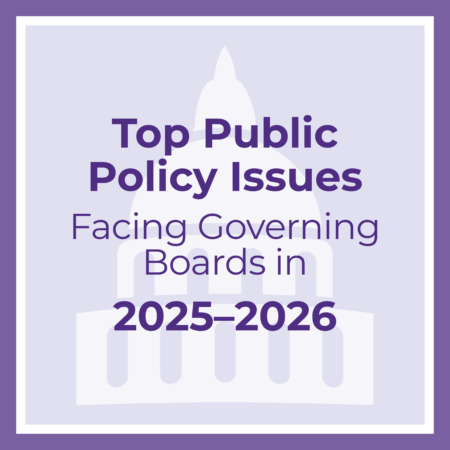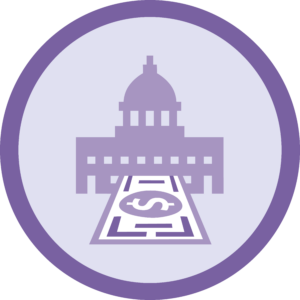
Executive Summary
Published March 28, 2025
Cover letter from AGB Board Chair and Acting President and CEO Ross A. Mugler.
The beginning of the new presidential administration has brought significant changes and challenges for higher education leaders, including presidents, chancellors, and governing boards. The administration has proposed major shifts in federal education policy, including efforts to eliminate or reduce the role of the U.S. Department of Education and reduce support for diversity, equity, and inclusion (DEI) from both the federal government and recipients of federal grants. While aiming to limit the federal role in education, the administration has also introduced new directives affecting how colleges and universities develop and implement institutional policies. These changes are the subject of ongoing legal challenges in federal courts. With the House, Senate, and White House all under Republican control, and limited signs of bipartisan alignment on higher education issues, major shifts in policy direction are unlikely before the 2026 election, at the earliest.
Public institutions in a growing number of states have received directives to eliminate DEI-related staff positions and programs focused on increasing diversity in student enrollment and faculty hiring. At the federal level, the executive branch has introduced policies that affect how private institutions manage admissions, respond to campus protests, and address concerns related to anti-Semitism, with potential implications for federal grants eligibility—as seen in Columbia University’s loss of $400 million in funding. Some institutions have also raised concerns about how federal actions might impact their ability to offer targeted support services for LGBTQ+ students.
While changes in rules and regulations are common during transitions between administrations, recent shifts in federal education policy have occurred at an especially rapid pace.
Higher education institutions face a myriad of challenges, not all due to what happens in the nation’s capital. Public confidence in higher education has continued to decline, influenced by ongoing concerns over tuition prices and questions about the value of degrees in today’s job market. Besides addressing the need to regain public support for and trust in higher education, institutions face the need to sustain enrollments as the demographic tide of young, prospective students has finally turned. Fewer students are graduating from U.S. high schools. International-student enrollments could be impacted by changes to visa eligibility and travel regulations. Enrollment of Chinese students—already down from a third to one-quarter of the 1.1 million international-student population—could continue to decline along with scholarly exchanges as relations strain between the two countries.
Accreditation could change under the new administration, which has expressed interest in replacing current accreditors and overhauling the existing system. Currently, accreditation is carried out by dozens of agencies recognized by the U.S. Department of Education to conduct peer review of colleges’ credentials and performance every five to ten years. If responsibility for accreditation were to be reassigned—such as to individual states—this could lead to greater variation in oversight approaches and could subject public colleges and universities to increased political pressure at home.
The new administration’s plans to increase immigration enforcement, including the deportation of individuals without legal authorization, present complex considerations for colleges and universities. An estimated 400,000 undocumented students are enrolled in U.S. colleges and universities, with fewer than half enjoying the protection of the Deferred Action for Childhood Arrivals (DACA) program, whose future remains uncertain.
This Top Public Policy Issues Facing Governing Boards report examines these policy challenges through six lenses:
- Accountability and Regulation;
- Judicial Outcomes;
- Political Intrusion;
- Federal and State Funding;
- Federal Tax Legislation; and
- Intercollegiate Athletics.

Accountability and Regulation
The new president, rather than pursuing the traditional regulatory revision process, issued a series of executive orders aimed at accelerating policy changes. His administration also made personnel changes involving civil servants and federal board members viewed as misaligned with the administration’s priorities. He froze the income-related student-loan repayment program that President Joe Biden had sought to reform. Federal courts had already struck down Biden’s effort to forgive $400 million in student-loan debt through executive action. The new administration also reversed guidance related to Title IX of the Education Amendments of 1972 that had expanded protections for transgender athletes wishing to participate on women’s sports teams.

Judicial Outcomes
In the courts, the president was expected to rely on the U.S. Supreme Court’s conservative majority to review key executive actions. But the court is an independent and coequal branch of government under the U.S. Constitution and is responsible for determining the scope and limits of presidential authority through its rulings.
Federal courts from the district level to the Supreme Court have played an active role in interpreting the limits of executive authority, regardless of which party controls the White House. Judges have at times expanded judicial oversight in cases where congressional legislation was seen as ambiguous or lacking in implementation details. During the Biden Administration, courts issued rulings that blocked several regulations and executive actions, including those related to Title IX and student loan forgiveness. It remains to be seen how courts will approach similar challenges under the new administration. Questions such as the future of the DACA program continue to be unresolved. In 2019, the Supreme Court, in a 5–4 decision, blocked an earlier attempt by the administration to rescind DACA; however, the composition of the court has since shifted with the retirement and passing of two liberal justices.

Political Intrusion
Long before the outbreak of the current conflict in Gaza and subsequent protests on U.S. campuses, accompanied by a rise in incidents of anti-Semitism, concerns have been raised, particularly among conservatives, that U.S. higher education institutions—especially selective ones—were ideologically unbalanced and not always welcoming to a broad range of viewpoints. Recent protests criticizing Israel’s actions have led to reports from some Jewish students feeling unsafe, drawing additional attention from lawmakers who have expressed broader concerns about the direction of higher education.
Governing boards, presidents, and chancellors face the challenge of upholding the right to free speech—even loud, contentious, and controversial speech—and protecting academic freedom, while not allowing protests to interfere with the essential education mission of their institutions. A growing number of colleges and universities have adopted institutional-neutrality positions of not speaking out on controversial social and political issues.

Federal and State Funding
The financial outlook for colleges and universities over these next two years is uncertain. With Social Security and Medicare—the two largest entitlement programs—largely excluded from proposed cuts, lawmakers might face pressure to reduce spending in other areas to offset the costs of extending the president’s 2017 tax cuts and fulfilling his campaign promise to add new ones. During the president’s first term, Congress did not approve proposed reductions to the National Institutes of Health, which provides significant research funding to universities, but future funding levels remain unclear. At the state level, the ability to sustain or increase their support for higher education is also uncertain. The post-pandemic surpluses in state budgets have now diminished.
One good sign was the continued growth of college and university endowments, which rose 11.2 percent on average in 2024 for the 658 largest endowments. The median endowment at those institutions was just under a quarter-billion dollars, and almost half the money they withdrew from endowments went to student financial aid. However, alongside this encouraging news, there was ongoing discussion in Congress about the possibility of increasing the 1.4 percent excise tax on the earnings of the largest endowments and expanding its scope to include additional institutional endowments.
There was good funding news for public colleges and universities at the state level. The strong economy allowed states to boost support for public higher education institutions by 10.2 percent for fiscal 2024, to $126.5 billion, according to the State Higher Education Executive Officers Association (SHEEO). But the National Association of State Budget Officers forecast that after several “extraordinary years of widespread, substantial surpluses (and) record-setting revenue growth,” states can anticipate only modest growth in their budgets for fiscal year 2025. Higher education systems in California, Maryland, and elsewhere were facing cuts.
While college closures continued apace in 2024, postsecondary enrollment rose 4.5 percent for fall 2024 and now stands above the 2019 pre-pandemic levels. Average tuition and fees were $11,610 at four-year public colleges and universities, $43,350 at four-year private institutions, and $4,050 at community colleges, the College Board reported.

Federal Tax Legislation
With full Republican control of Congress and the White House, a major federal tax package is expected in 2025, likely through budget reconciliation to extend provisions of the 2017 Tax Cuts and Jobs Act and introduce new cuts. The cost of these measures—estimated at up to $7.75 trillion over a decade—has prompted lawmakers to explore offsets, placing higher education tax provisions under scrutiny.
Key proposals include a sharp increase to the 1.4 percent excise tax on large private college endowments and an expansion of its scope. Other proposals would tax all scholarships and fellowships, including Pell Grants, and eliminate education-related tax benefits such as the American Opportunity and Lifetime Learning credits, the student loan interest deduction, and tax-exempt bond interest. A plan to revoke nonprofit hospitals’ tax-exempt status could affect academic medical centers, while additional measures have raised concerns about how institutional activities—such as student group affiliations or international research—could impact institutions’ tax status. Advocates are also pushing to restore a non-itemizer charitable deduction to support small donors and to raise the long-standing $5,250 cap on employer-provided, tax-free education assistance, along with expanding tax exclusions to cover student living expenses.

Intercollegiate Athletics
Institutions small and large are grappling with the upheaval in intercollegiate athletics that has fractured the student-athlete model. The professionalization of big-time college sports—with players’ making thousands from marketing their name, image, and likeness and their ability to switch schools to go to the highest bidder—might have unseen consequences. A pending $2.8 billion settlement between the National Collegiate Athletic Association (NCAA) and past and current Division I players could have a ripple effect on institutions outside the so-called “power” conferences. If such institutions chose to, they could pay players directly and award more scholarships, but they would have to abide by new NCAA roster caps that might lead some to jettison athletics teams that generate less revenue and brand recognition than the major sports. That could hurt colleges that count on strong athletic programs to draw tuition-paying students eager to try out for a varsity team as well as those who never put on a uniform. Sports are essential to many institutions’ identity and often important to successful fundraising.
Acknowledgments
AGB thanks the following advisory group members who added value to this document through their questions and comments, which proved invaluable in strengthening the final report.
- Christopher Connell, writer, freelance
- David Baime, senior vice president, government relations, American Association of Community Colleges (AACC)
- Ona Alston Dosunmu, president and chief executive offer, National Association of College and University Attorneys (NACUA)
- Jon Fansmith, senior vice president, government relations and national engagement, American Council on Education (ACE)
- Brian Flahaven, vice president, strategic partnerships, Council for Advancement and Support of Education (CASE)
- Sarah Flanagan, vice president for government relations and policy development, National Association of Independent Colleges and Universities (NAICU)
- Tom Harnisch, vice president for government relations, State Higher Education Executive Officers Association (SHEEO)
- Luis Maldonado, vice president of government relations and policy analysis, American Association of State Colleges and Universities (AASCU)
- Robert Moran, principal, Bose Public Affairs Group
- Barmak Nassirian, vice president for higher education policy, Veterans Education Success (VES)
- Alex Nock, principal, Penn Hill Group
- Richard Novak, senior fellow and consultant, AGB
- Matt Owens, president, Council of Governmental Relations (COGR)

